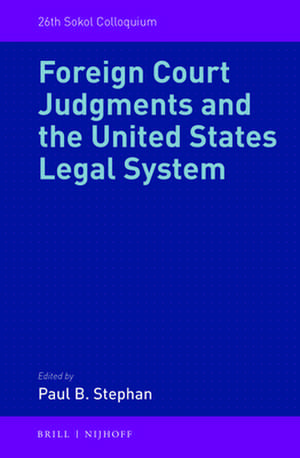Foreign Court Judgments and the United States Legal System: Sokol Colloquium, cartea 7
Editat de Paul B. Stephanen Limba Engleză Hardback – 2 iul 2014
Foreign Court Judgments and the United States Legal System offers a nuanced and thorough collection of analyses from experts in the field regarding a multifarious and often contentious aspect of international law.
Preț: 619.79 lei
Preț vechi: 755.84 lei
-18% Nou
Puncte Express: 930
Preț estimativ în valută:
118.59€ • 123.83$ • 97.93£
118.59€ • 123.83$ • 97.93£
Carte indisponibilă temporar
Doresc să fiu notificat când acest titlu va fi disponibil:
Se trimite...
Preluare comenzi: 021 569.72.76
Specificații
ISBN-13: 9789004278912
ISBN-10: 9004278915
Pagini: 188
Dimensiuni: 155 x 235 x 15 mm
Greutate: 0.43 kg
Ediția:VIII, 188 Pp.
Editura: Brill
Colecția Brill | Nijhoff
Seria Sokol Colloquium
ISBN-10: 9004278915
Pagini: 188
Dimensiuni: 155 x 235 x 15 mm
Greutate: 0.43 kg
Ediția:VIII, 188 Pp.
Editura: Brill
Colecția Brill | Nijhoff
Seria Sokol Colloquium
Cuprins
Paul B. Stephan, Introduction
PART I: EXISTING DOCTRINE AND THE FOURTH RESTATEMENT
Chapter One: George Rutherglen and James Y. Stern, “Sovereignty, Territoriality, and the Enforcement of Foreign Judgments”
Chapter Two: Pamela K. Bookman, “Once and Future U.S. Litigation”
Chapter Three: William S. Dodge, “The Penal and Revenue Rules, State Law, and Federal Preemption”
Chapter Four: Paul B. Stephan, “Unjust Legal Systems and the Enforcement of Foreign Judgments”
PART II: STATUTORY REFORM OF THE LAW OF RECOGNITION AND ENFORCEMENT
Chapter Five: Linda Silberman, “The Need for a Federal Statutory Approach to the Recognition and Enforcement of Foreign Country Judgments”
Chapter Six: Keith Loken, “The Current U.S. Judgments Agenda”
Chapter Seven: Peter D. Trooboff, “Implementing Legislation for the Hague Choice of Court Convention”
Chapter Eight: David P. Stewart, “Implementing the Hague Choice of Courts Convention: The Argument in Favor of ‘Cooperative Federalism’”
Chapter Nine: Kevin L. Cope, “Reconceptualizing Recognition Uniformity”
Chapter Ten: Timothy J. McEvoy, “Common Law Versus Statutory Approaches to Enforcing Foreign Judgments”
PART I: EXISTING DOCTRINE AND THE FOURTH RESTATEMENT
Chapter One: George Rutherglen and James Y. Stern, “Sovereignty, Territoriality, and the Enforcement of Foreign Judgments”
Chapter Two: Pamela K. Bookman, “Once and Future U.S. Litigation”
Chapter Three: William S. Dodge, “The Penal and Revenue Rules, State Law, and Federal Preemption”
Chapter Four: Paul B. Stephan, “Unjust Legal Systems and the Enforcement of Foreign Judgments”
PART II: STATUTORY REFORM OF THE LAW OF RECOGNITION AND ENFORCEMENT
Chapter Five: Linda Silberman, “The Need for a Federal Statutory Approach to the Recognition and Enforcement of Foreign Country Judgments”
Chapter Six: Keith Loken, “The Current U.S. Judgments Agenda”
Chapter Seven: Peter D. Trooboff, “Implementing Legislation for the Hague Choice of Court Convention”
Chapter Eight: David P. Stewart, “Implementing the Hague Choice of Courts Convention: The Argument in Favor of ‘Cooperative Federalism’”
Chapter Nine: Kevin L. Cope, “Reconceptualizing Recognition Uniformity”
Chapter Ten: Timothy J. McEvoy, “Common Law Versus Statutory Approaches to Enforcing Foreign Judgments”
Notă biografică
Paul B. Stephan is the John C. Jeffries, Jr. Distinguished Professor of Law, David H. Ibbeken ’71 Research Professor, and Graduate Studies Program Director at the University of Virginia School of Law. An expert on international business and Soviet and post-Soviet legal systems, Stephan has advised governments and international organizations, organized conferences, edited books and lectured to professionals, university groups and high school students on a variety of issues raised by the globalization of the world economy and the transition away from Soviet-style socialism. During 2006-07, he served as counselor on international law in the U.S. Department of State. Other interests for Stephan, who joined the University of Virginia’s law faculty in 1979, include international law, taxation and constitutional law.


